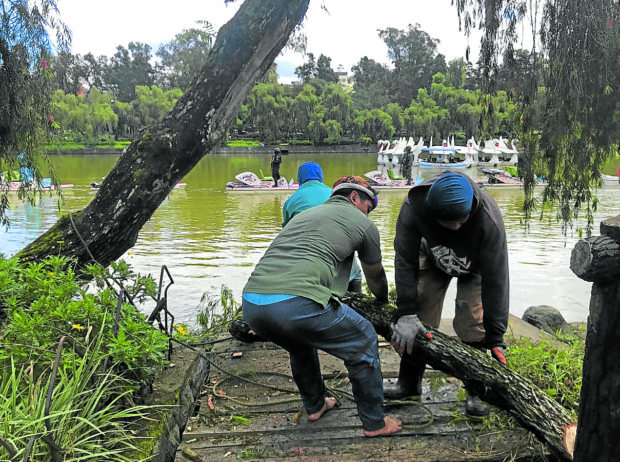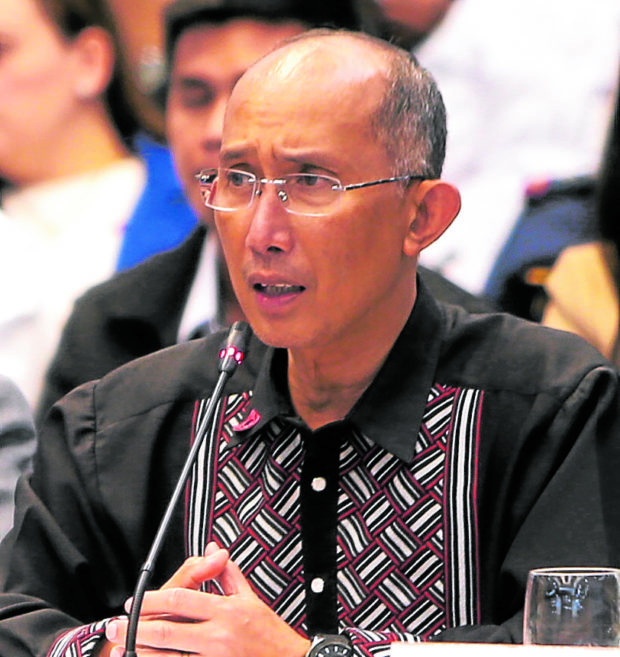Baguio’s anti-COVID moves get WHO nod

LAKE ‘LIGPIT’ Government gardeners have been cleaning up Burnham Park, where trees and flowers have rejuvenated in the absence of promenaders who were locked indoors during the lockdown. —VINCENT CABREZA
BAGUIO CITY, Benguet, Philippines — A World Health Organization (WHO) team has given this city good grades for its health measures against the new coronavirus disease (COVID-19), citing its network that included two facilities tasked with detecting virus infection.
But the team also advised Baguio hospitals to prepare “for possible surges” in infections, which are now occurring in Metro Manila, Dr. Thea Cajulao of Baguio General Hospital and Medical Center (BGHMC) said at a virtual press briefing on Thursday.
Contact tracing
BGHMC, one of the first hospitals outside Metro Manila to be tasked with detecting coronavirus transmissions, was praised for displaying “strong leadership, good communication direction and teamwork” of the front-liners against the pandemic, said Cajulao, an infectious disease specialist.
A laboratory put up by private doctors is the second accredited COVID-19 facility in Baguio.
As of Friday, 10 suspected COVID-19 patients were being treated in the hospital.
Article continues after this advertisementThis week, Mayor Benjamin Magalong was appointed by Malacañang as one of the country’s COVID-19 “czars” on contact tracing. He had led training sessions in Metro Manila, Cebu, Cagayan Valley and Southern Luzon.
Article continues after this advertisementDr. Takeshi Kasai, director of the WHO office for Western Pacific, and Dr. Rabindra Abeyasinghe, country representative, led the team that visited Baguio on July 10 to July 11 as part of the WHO’s continuing documentation of the country’s best practices in response to the pandemic.
The team also studied a contact tracing system, which combined digital technology and cognitive interviews, that Magalong began sharing with other communities.
Baguio’s molecular laboratories have been processing samples from the Cordillera, Cagayan Valley and Pangasinan province. A combined personnel of 40 medical technicians and six encoders test up to 2,000 samples a day.
BGHMC also trains specialists from other provinces.
The WHO team also examined the health protocols of other hospitals, such as Benguet General Hospital in La Trinidad town.
In Central Luzon, Aurora is the only province that has no COVID-19 case due to the natural barriers provided by the long stretch of the Sierra Madre range and the Pacific Ocean. The province, with a population of 250,000, is covered by low-risk modified general community quarantine.
The capital town, Baler, is more than 200 kilometers north of Metro Manila, and the other towns and communities are too far apart for quick viral transmission, according to Gov. Gerardo Noveras.
The province’s status was confirmed on Friday by Dr. Jessie Fantone, head of the regional epidemiological and surveillance unit of the Department of Health.
How the local government managed to prevent contamination was “worth studying and replicating,” Fantone said.
Peace of mind
“For months now, we have kept Aurora safe and this is giving our people their peace of mind. Let us not allow this to be shattered by people who wish us harm,” Noveras said.
He said prevention had been the main tack because the public and private health sector in the province could not treat COVID-19 patients.
Should Aurora encounter severe cases, patients would be treated in Cabanatuan City in Nueva Ecija province because “our [four] hospitals are not ready,” he said.
Barangay leaders also keep track of strangers in their areas, he said, adding that when the lockdown was eased, nonresidents were ushered out as soon as their purpose for visiting had been accomplished.
But Noveras said he could not guarantee that Aurora would remain safe from COVID-19. Some residents were caught allowing relatives into the province, he said.
As of July 14, Central Luzon had reported 1,548 cases, with Bulacan, Bataan and Pampanga provinces registering the most number of cases at 735,249 and 166, respectively.
In Nueva Ecija, two infected patients died on Thursday. On the same day, La Union province reported the biggest number of new COVID-19 patients in a day after 17 cases were recorded in San Fernando City and the towns of Aringay, Bauang, Balaoan and San Juan.
—Reports from Vincent Cabreza, Tonette Orejas, Yolanda Sotelo and Armand Galang
For more news about the novel coronavirus click here.
What you need to know about Coronavirus.
For more information on COVID-19, call the DOH Hotline: (02) 86517800 local 1149/1150.
The Inquirer Foundation supports our healthcare frontliners and is still accepting cash donations to be deposited at Banco de Oro (BDO) current account #007960018860 or donate through PayMaya using this link.
